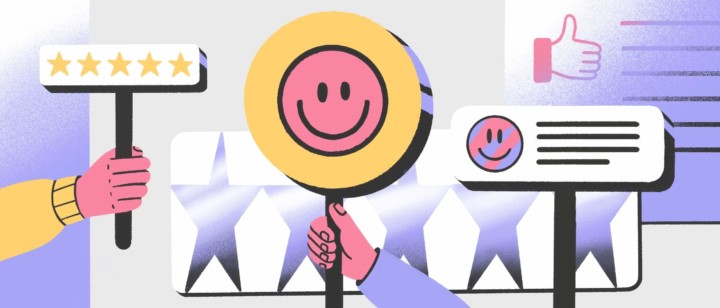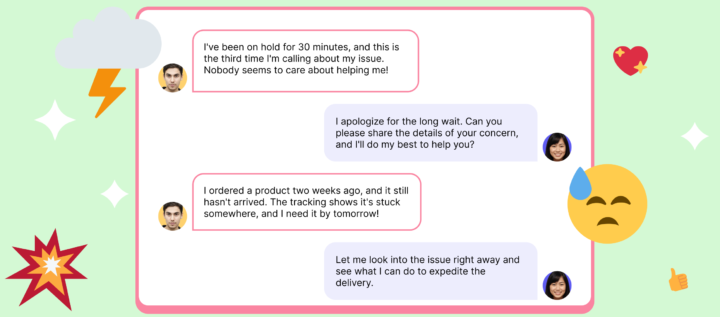How to train a live chat agent

We’ve all happened to find ourselves in a situation when we had to switch some of our processes into remote mode. Support work is especially important at times like these. Your support managers have to process much more tickets than usual, trying not to go insane while doing it.
We had a chat with Irene, Customer Support Team lead at Dashly. We’ve talked about how she trains her chat agents and what secrets helped her make the ultimate support team ready to handle any worldly possible distress. We are super sharing, so here’s all the stuff!
You must let your agents make mistakes. They must have a chance to try out new cases without being afraid to take on harder tasks. That may be a pain for your customers at times, but that’s the only way to learn.Just like it is for doctors
Irene Allen, Customer Support Team lead
What to begin with
Let your new agent work on a real case
One of the first tasks you may give your new chat agent is to let them take a real user’s case and go through the customer path with this client. This will be a good way to teach your agent, they will learn who to ask for help in different situations, how to find out what’s broken, what solutions a customer wants to implement, and what problems the client is facing. In turn, this will let you analyze the capabilities of your candidate and what skills they need to develop. Don’t forget to tell your customer that it’s a new employee that’s working on their problem.
At the very beginning of my training process I was leading a customer through introduction. They were very demanding, but they really didn’t want to pay for our services. I warned them I was new here so I don’t know anything, but I’ll ask around if I have to. It was an e-commerce customer, we went over basic cases with them during that process. Our new agents do the same thing
Irene Allen, Customer Support Team lead
If you only give your new support agent typical tasks or cases that you’ve already worked through, they’ll be lacking in motivation and won’t see the goal in solving that case. Cases like that carry no practical use, they’re set artificially and abstracted from the real customers. Try to give your new agent an opportunity to help your customer in real-time with a voice call. This way, your agent will train their communication skills, learn how to solve problems, and find useful information.
Systematize theoretical information
Don’t forget about the theoretical aspect of the training. And don’t just pile up every bit of information your agent may ever need on them at once — let them freely use their time to study. Set a checkpoint at which you’ll test your agent for how good they’ve learned theoretical information, this test may be taken in a form of conversation.
Dashly support team keeps their theoretical basis in Trello cards, one card for one week. For each week, the new agent is given several topics with links to the articles they have to examine. That gives the candidate space to switch from one article to another.

How to train your chat agent
Once you know your agent is done with the theoretical stage, let them solve some of the already solved cases. Give them some random case or one of the relatively easy cases that you’ve already solved. Remember, the goal of your agent is to solve this case through to the end, leaving your customer thankful and satisfied. Your candidate will have to keep a journal on each of these cases so you can then analyze these cases and discuss what was done right and what was done wrong together with your new agent.

Leading my Trello journal helped me systematize my knowledge. I could always go back to the cases I’ve already solved and use them when working on new cases, I could study them in more detail when I had time to
Ethan Anderson, Customer Support Manager
Let your new agent use your knowledge sources to solve these cases. Your customer knowledge base and your internal knowledge base will be a great help to your agents. Don’t make your new employee learn it all by heart, they must learn how to use the knowledge sources when needed.
The best people to train your new live chat agents is people that do the job every day. When you have a staff of agents, utilize them to test the new agent at the same time, throwing the most common questions they receive their way. Any mistakes made will only be dealt with internally, and at the beginning, there’ll be lots of mistakes!
Flynn Zaiger, CEO in Optimistic About Scottsdale Search
The goal of training on such cases is not to overload your candidate with the knowledge, but to teach them to navigate information so that they know who to ask and what source will help them find the right answers. This skill won’t come with the flick of the wrist, though, it will take some time to master it.
I think it’s useless to just shove information like this into a person’s head with no context. They just won’t memorize it. An agent must be able to get back to a case they’ve once worked on, use the tips they’ve left to themself and automate the process of searching for information
Irene Allen, Customer Support Team lead
An IT agent must also know different programming languages and how scripts work to figure out the issues their customers face. Free resources help with figuring that out, there are lots of learning courses and articles on such topics online. For a better understanding of how product companies work, Irene recommends reading “The Mom Test: How to Talk to Customers & Learn If Your Business is a Good Idea When Everyone is Lying to You” by Rob Fitzpatrick.
When your new guy is struggling to solve a problem on their own, don’t leave them hanging. Promise them to help, but first, ask them to describe their way of finding the solution. Reflexing on that will help them understand what they did wrong and what’s slipped through the cracks. This way, they’ll learn to solve problems.
How much time does the training have to take
The onboarding time depends on what position a new employee is going to be taking. If it’s daytime, self-sufficient agent, a normal training course will take about 3 months for them.
- during the first one and a half months of the training, an agent will be learning how to search for information;
- during the rest of the course, an agent learns how to talk to the customers and how to solve their problems or who to ask for help.
Don’t get overprotective of the new guy, they mustn’t feel being under surveillance, like the team lead is constantly watching them make sure do their work during these 3 months. An agent must desire to discover new things and strive to be self-sufficient.
I’m all out for maximum self-sufficiency, otherwise, a person gets used to working under surveillance. One must have a desire to learn new things
Irene Allen, Customer Support Team lead
How to test your agent
- Make a list of questions on theory that your new employee must be able to answer by the end of their training: these may vary from the content they can find in your knowledge sources to being able to move around in your platform freely. Your agent must have an understanding of how your API works on the logical level, how to read scripts and so on.
- Look at the number of conversations they take in a certain amount of time. Still, speed isn’t the point of this 3-month training. What they’ll really need to learn is how to find solutions to various issues and how to communicate with your customers. Your new employee needs to work like a real agent, even if a fairly slow one.
- Set checkpoints for each training week. This checkpoints will let your agent demonstrate their soft skills and show how they’re settling into your product. Check on your new guy even if they already have a rich support experience. If your potential employee’s onboarding is taking too long, it means they’re having issues that you and them will have to go over with.
- Use a 360 framework for evaluating a new employee. This method will help you find out more about the personality of your new employee. If they’re being rude with your team, while not showing it to the team lead, that’s bound to get uncovered.
How to measure your agent’s growth
They can work on developing separate skills, but this should be done individually, and your employee must have their inner motivation. If they’re catching up to new tasks quickly and easily, you can give them something new to work on. It’s impossible to just make a three-year training plan in advance.
I’m developing when new tasks come in. I do some reflection, I analyze the way I formulate my tasks to my guys, how I communicate with them, how I schedule tasks and if I’m getting enough rest to be productive during the work day. New information constantly comes in without my direct involvement
Irene Allen, Customer Support Team lead
You can keep an eye on how your agents solve tasks. At the same time, don’t impose an atmosphere of constant control on them. A solution doesn’t have to be perfectly flawless for a person’s skills to progress.
To keep the variety, your agents may work on individual projects. Here’s what Dashly agents do: Veronica writes knowledge base articles and helps with accounting. Xenia works with churn and handles financial issues. Ethan helps write articles for our blog and works with documentation. Oh, and there’s Joseph, he can do anything. Each of them is good at what they’re doing because they’re given a chance to work on projects they’re interested in.

If a person doesn’t enjoy doing something, you won’t ever be able to make them do it right. It may work one time, sure, but it won’t lead to anything good in the long-term perspective
Irene Allen, Customer Support Team lead
Basic rules
Let your agent solve a real case and work together on the mistakes your agent made when solving the case.
Pay no attention to minor mistakes at first, taking all of the mistakes your new employee may have made might appear too hard for them. Criticism and guiding must be taken in doses.
Throughout the training, go from discussing major mistakes to discussing smaller mistakes. Do the polishing last, let your agent adapt.
Don’t try to do everything for your agent. Give them a chance to show themself and think of solutions on their own. If you make everything for them, they may get used to it. Let them schedule the time they spend finishing their tasks for themself.
How it works in Dashly
We’ve described how it works in the Dashly support team. If you doubt these methods are effective, take a look at our February metrics:
- average first answer speed — 5 min 40 sec
- average conversation rating — 4,79.







